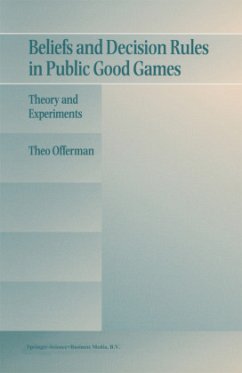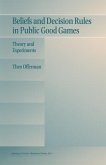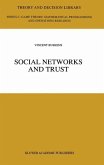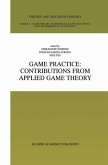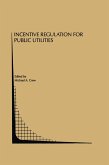Part I provides an introduction to this study of players' beliefs and decision rules in to obtain data in order to public good games. The experimental method will be used test theoretical ideas about beliefs and decision rules. Chapter 1 discusses some methodological issues concerning experimentation in the social sciences. In particular, this chapter focuses on the relationship between experimental economics and social psychology. Chapter 2 provides an overview of psychological and economic ideas concerning players' beliefs and decision rules in public good games. This chapter forms the theoretical foundation of the book. Chapter 3 discusses some basic experimental tools which will be used in the experiments to be reported in part II. These basic experimental tools make up two procedures, to obtain a measure of a player's social orientation and a measure of her or his beliefs. 1. Experimentation in the social sciences 1.1 Introduction The study of human behavior is an area whereeconomics and psychology overlap. Although both disciplines are concerned with the same human beings, they often have different points of view on how people make choices and the motivation behind it.
`The great merit of the book is that it demonstrates that an interdisciplinary approach is not only possible but also fruitful. The book should not only be recommended to all who are especially interested in contribution behavior in a specific step-level public good environment. It is also a rich source to all who are in search for a comprehensive and profound analysis of human decision making and belief forming.' European Journal of Political Economy, 14 (1998) `... this is definitely recommended reading material, especially for those interested in the public goods issue, and social dilemmas in a more general sense. But since it is so rich in its overview of the recent experimental literature and methods, it will also prove very useful for all those interested in economic behavior in general, and in expectations, preferences, and learning in particular.' Journal of Evolutionary conomics, 9:3 (1999)
`The great merit of the book is that it demonstrates that an interdisciplinary approach is not only possible but also fruitful. The book should not only be recommended to all who are especially interested in contribution behavior in a specific step-level public good environment. It is also a rich source to all who are in search for a comprehensive and profound analysis of human decision making and belief forming.'
European Journal of Political Economy, 14 (1998)
`... this is definitely recommended reading material, especially for those interested in the public goods issue, and social dilemmas in a more general sense. But since it is so rich in its overview of the recent experimental literature and methods, it will also prove very useful for all those interested in economic behavior in general, and in expectations, preferences, and learning in particular.'
Journal of Evolutionary conomics, 9:3 (1999)
European Journal of Political Economy, 14 (1998)
`... this is definitely recommended reading material, especially for those interested in the public goods issue, and social dilemmas in a more general sense. But since it is so rich in its overview of the recent experimental literature and methods, it will also prove very useful for all those interested in economic behavior in general, and in expectations, preferences, and learning in particular.'
Journal of Evolutionary conomics, 9:3 (1999)

